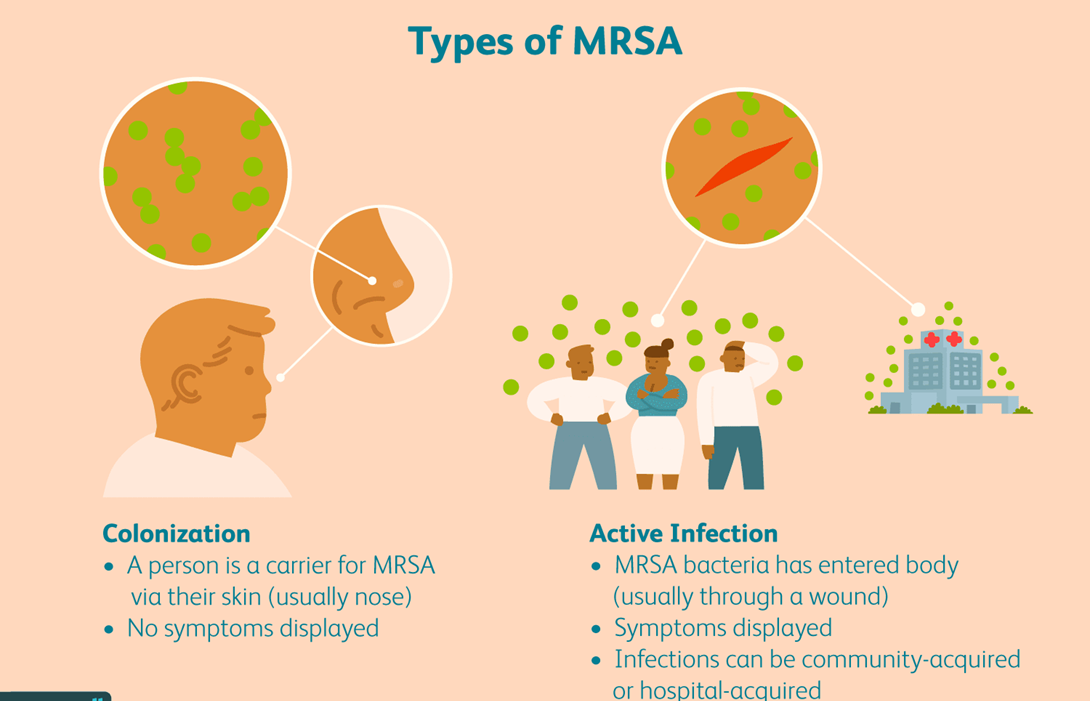A home health nurse manager is caring for a client who has methicillin-resistant Staphylococcus aureus (MRSA). Which of the following actions should the nurse take?
Remove fresh flowers from the client's home.
Wear a mask when within 3 feet of the client.
Encourage the client to use a HEPA filter in the house.
Double bag soiled dressings in polyethylene bags.
The Correct Answer is D
Choice A reason: Removing fresh flowers from the client's home is not an action that the nurse should take when caring for a client who has MRSA. Fresh flowers do not pose a risk of transmitting MRSA, and may provide some psychological benefits for the client.
Choice B reason: Wearing a mask when within 3 feet of the client is not an action that the nurse should take when caring for a client who has MRSA. MRSA is not an airborne infection, and a mask is not necessary to prevent its spread. The nurse should wear gloves and a gown when in contact with the client or the client's environment, and perform hand hygiene before and after the contact.
Choice C reason: Encouraging the client to use a HEPA filter in the house is not an action that the nurse should take when caring for a client who has MRSA. A HEPA filter is not effective in removing MRSA from the air, and may not have any impact on the client's health. The nurse should educate the client on how to clean and disinfect the surfaces and items that may be contaminated with MRSA, such as bedding, towels, and personal items.
Choice D reason: Double bagging soiled dressings in polyethylene bags is an action that the nurse should take when caring for a client who has MRSA. This is a standard precaution to prevent the exposure of other people or the environment to the infectious material. The nurse should also label the bags as biohazardous waste and dispose of them according to the agency's policy.

Nursing Test Bank
Naxlex Comprehensive Predictor Exams
Related Questions
Correct Answer is D
Explanation
Choice A reason: Bradycardia is not a manifestation of alcohol withdrawal, but rather a sign of low heart rate. Alcohol withdrawal typically causes tachycardia, or high heart rate, as the body tries to compensate for the sudden absence of alcohol.
Choice B reason: Hypothermia is not a manifestation of alcohol withdrawal, but rather a sign of low body temperature. Alcohol withdrawal typically causes hyperthermia, or high body temperature, as the body reacts to the withdrawal symptoms.
Choice C reason: Increased appetite is not a manifestation of alcohol withdrawal, but rather a sign of hunger or craving. Alcohol withdrawal typically causes decreased appetite, or anorexia, as the body loses interest in food and suffers from nausea and vomiting.
Choice D reason: Insomnia is a manifestation of alcohol withdrawal, and one of the most common and distressing symptoms. Alcohol withdrawal causes insomnia, or difficulty falling or staying asleep, as the body experiences anxiety, agitation, and nightmares.
Correct Answer is C
Explanation
Choice A reason: The client dressing her affected side first is not a finding that the nurse should report to the interprofessional care team, as it indicates that the client is following the proper technique for dressing after a stroke. Dressing the affected side first helps the client maintain range of motion and prevent contractures of the affected limbs.
Choice B reason: The client bearing weight on their arms when using crutches is not a finding that the nurse should report to the interprofessional care team, as it is a normal and expected way of using crutches. Bearing weight on the arms helps the client balance and support their body weight while walking with crutches.
Choice C reason: The client coughing when swallowing her medications is a finding that the nurse should report to the interprofessional care team, as it indicates that the client may have dysphagia, or difficulty swallowing, which is a common complication of stroke. Dysphagia can increase the risk of aspiration, pneumonia, dehydration, and malnutrition. The nurse should assess the client's swallowing ability and refer them to a speech-language pathologist for further evaluation and intervention.
Choice D reason: The client's caregiver filling a pill organizer weekly is not a finding that the nurse should report to the interprofessional care team, as it is a positive and helpful way of managing the client's medications. Filling a pill organizer weekly can help the client and the caregiver remember the medication names, doses, and schedules, and prevent medication errors or omissions.
Whether you are a student looking to ace your exams or a practicing nurse seeking to enhance your expertise , our nursing education contents will empower you with the confidence and competence to make a difference in the lives of patients and become a respected leader in the healthcare field.
Visit Naxlex, invest in your future and unlock endless possibilities with our unparalleled nursing education contents today
Report Wrong Answer on the Current Question
Do you disagree with the answer? If yes, what is your expected answer? Explain.
Kindly be descriptive with the issue you are facing.
